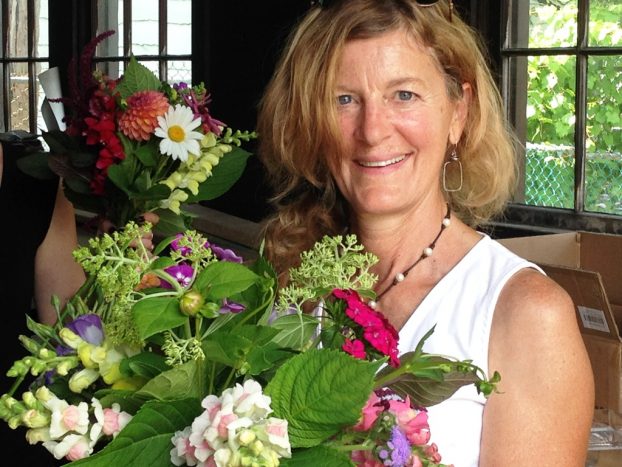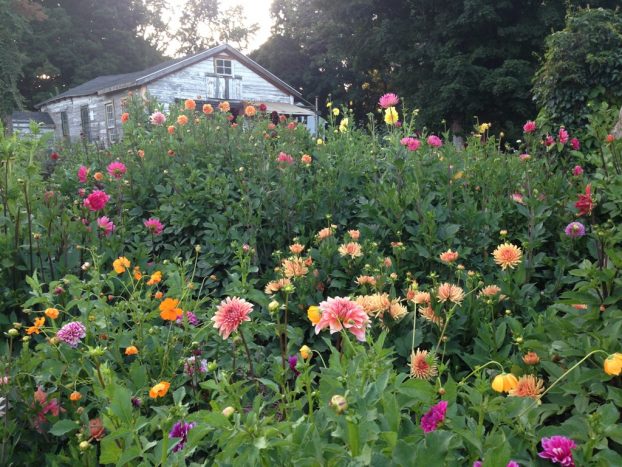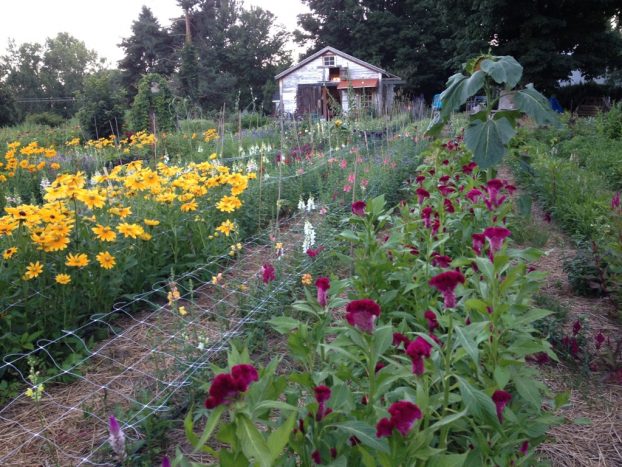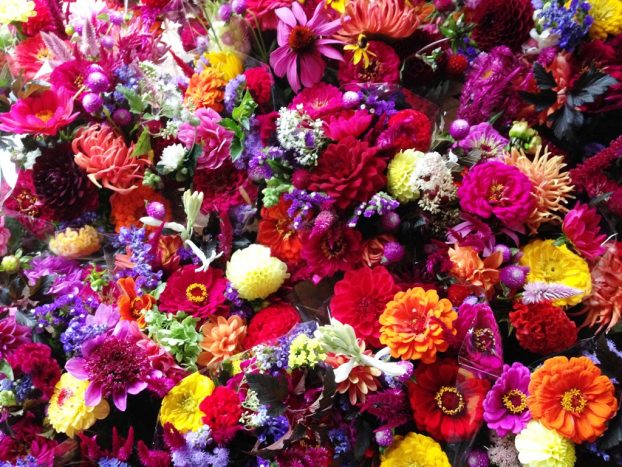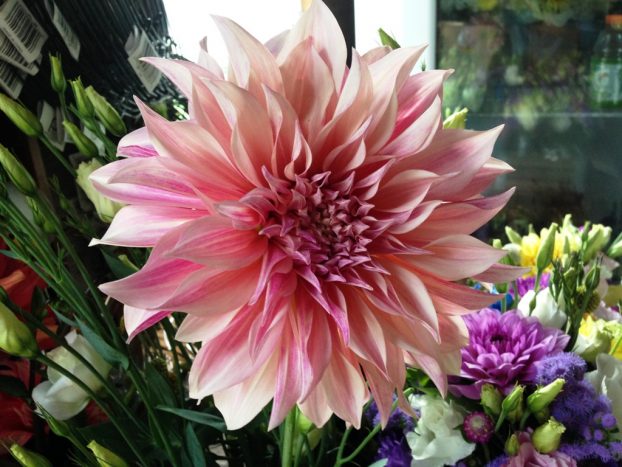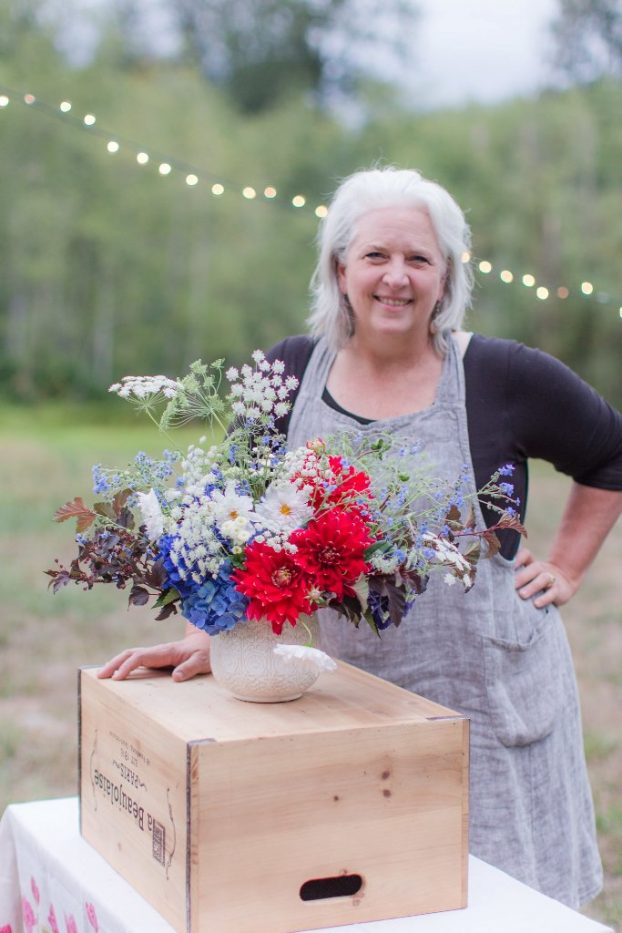Podcast: Play in new window | Download
Subscribe: Apple Podcasts | Podcast Index | RSS | More
SLOW FLOWERS IN THE NEWS
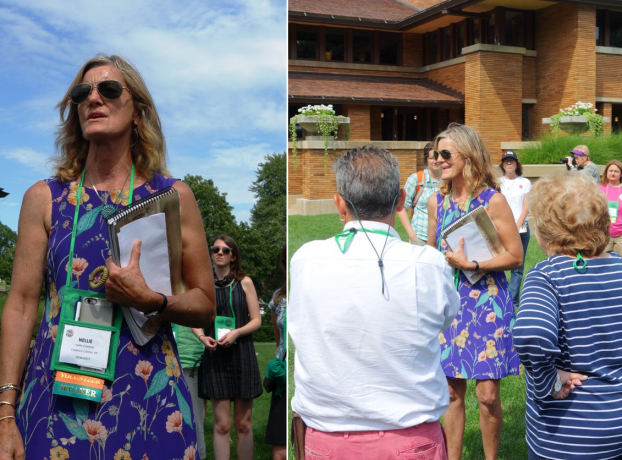
Nellie Gardner at the Frank Lloyd Wright-designed Darwin Martin House in Buffalo, where she led tours recently for attendees of the Garden Writers Association annual symposium.
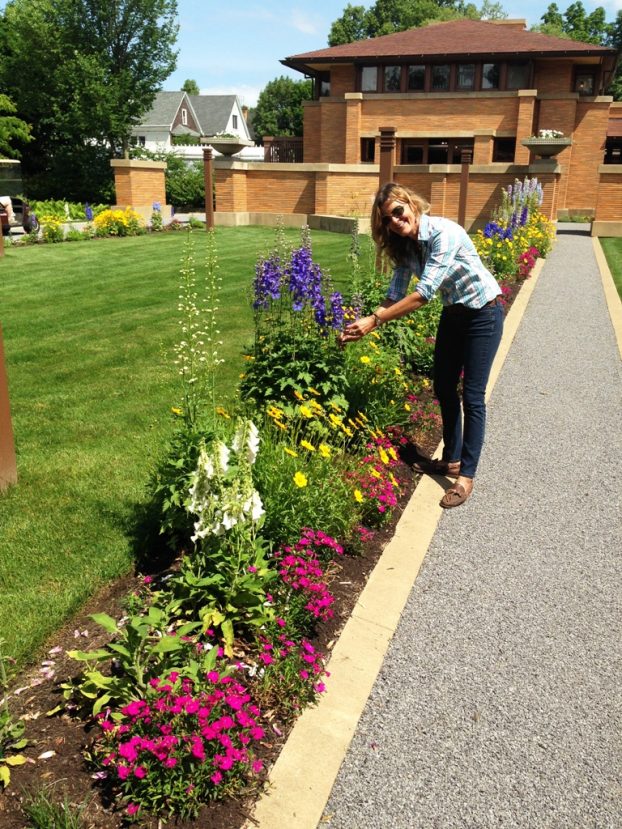
Nellie, pictured on the grounds of the Frank Lloyd Wright-designed Darwin Martin House in Buffalo, NY, where she is in charge of landscape restoration.
Today’s guest is a woman who I met “virtually” nearly six years ago, but we only recently connected face-to-face. Her name is Nellie Gardner. When the two of us corresponded in late 2011, Nell was the proprietor of Flower Fields, based outside Rochester, New York.
At the time, I was wrapping up the final manuscript for The 50 Mile Bouquet, and one of the last chapters I wrote was about the Association of Specialty Cut Flower Growers, called “From Their Fields to Your Vase.” I was a member of ASCFG, and a frequent reader of the members’ bulletin board where flower farmers posed questions and engaged in discussion on all sorts of topics.
One question caught my eye — from Emily Watson of Milwaukee, Wisconsin-based Stems Cut Flowers. As it turns out, Emily is a past guest of this podcast; we featured her in Episode 185 a few years ago when we discussed her decision to add a new floral studio called Wood Violet to her business model.
Emily’s question about the viability and sustainability of working 80 hour weeks as a flower farmer and wanting to know that it was worth it prompted heartfelt reactions from fellow ASCFG member-growers around the country. One message came from Nellie Gardener, who wrote this:
“I have been able to make a frugal living by growing cut flowers for 20 years, with no outside income or partner with an income. I can only do it by working like a madwoman most of the year, doing weddings, developing many outlets, and extending my Zone 5 season by making Christmas wreaths (and) offering workshops and classes. To make a living with cut flowers, you not only have to grow efficiently, have quality (product), sell to florists, wedding and special event designers, and sell in both retail and wholesale channels, you also have to reinvent yourself to sell all your skills to the public who is hungry for anything real. The competition is cheap labor in South America and the use of flowers as loss leaders in stores like Sam’s Club and BJ’s. Only some consumers will buy on conscience, not price.”
After reading her comments online, I contacted Nellie to ask for her permission to include them in The 50 Mile Bouquet and I promised to send her a copy of the book as my thanks. She agreed, and I believe the honest and sincere answers she wrote in reaction to Emily’s initial question gave readers an unusual peek into the life of a small-scale specialty cut flower grower.
Over the years I would catch glimpses of Nellie and her flowers, including a beautiful spread in Country Gardens magazine, for which I’m a contributing editor. It was one of those lavish, romantic flower farming stories that prompted me to say, “oh, I wish I had been able to write that!”
After all these years, Nellie and I finally met in person this past August, when she presented a roundtable topic at the Garden Writers Association annual symposium in Buffalo. I was ecstatic when I saw her name on the program. And the topic was a departure for Nellie — I thought. Rather than discussing cut flower farming, Nellie was there to share the story of gardening at the historic Graycliff Estate, a Frank Lloyd Wright-designed home on Lake Erie, built in 1926 for the Darwin Martin family. The grounds at Graycliff were originally designed by Ellen Biddle Shipman, a well-known landscape architect and contemporary of Wright’s. Once grand, like the estate, the gardens declined with age — and Nellie has assumed the role of horticulturist who is restoring the flower borders, harvest gardens and outdoor living spaces.
Well now, this was a new role for Nellie and it all makes sense now that I see this title on her web site for Flower Fields: “Cut flower grower, horticulture and gardening consultation.”
I reintroduced myself to Nellie and asked if she would join the podcast to share her story. What you’ll hear today is our rather spontaneous interview, recorded in the lobby of the Buffalo Marriott Hotel.
Here’s a short intro from Nellie’s “about” section of the Flower Fields web site:
Nellie grows cut flower on her Historic Spencerport Farm, and is also the Horticulturist at the Frank Lloyd Wright Darwin Martin House in Buffalo. Her experience growing up on a hardscrabble farm on Cape Breton Island, Nova Scotia gave her motivation to put herself through College to learn the science of soils and plants.
With no formal high school education and no money she earned a degree in Agriculture from Nova Scotia Agricultural College and Cornell University. Working for The Integrated Pest Management Program at Cornell, Cornell Cooperative Extension, and her own private consulting business, has given her a wide range of experience she applies to her approach to horticulture.
Seeing opportunity and making use of everything she finds grew out of necessity and reuse and repurposing are instinctive. She has grown cut flowers for over 20 years and consults in horticultural problem solving and cut flower growing.
Wow — at a time when so many are seeking ways to diversify their brand and business, I love seeing how one flower farmer’s path is taking her in a direction that is creatively challenging, professionally rewarding and thoroughly relevant to growing cut flowers.
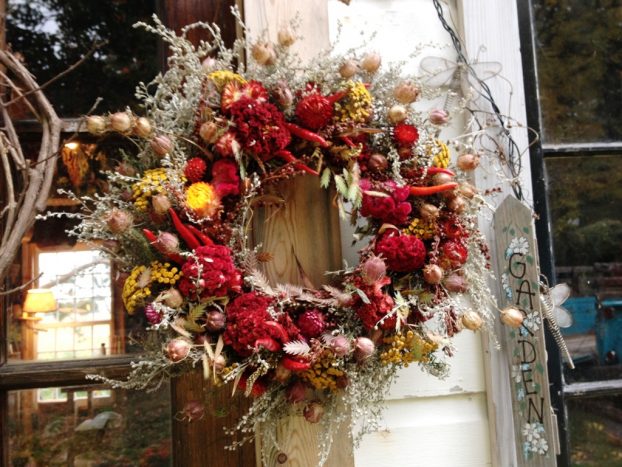
Nellie worked hard to diversify her business model at Flower Fields Farm, including wreath-making in the fall and winter months.
Find and Follow Nellie Gardner at these social places:
Thanks again for joining me today. The Slow Flowers Community continues to grow, with close to 1,500 members having joined our Facebook group and increased engagement on a daily basis over our other social platforms, including Instagram. We are gaining momentum and your participation is key. The media continues to pay attention and Slow Flowers has received some great press lately, both in the trade media thanks to our new partnership with Florists’ Review, as well as in print and online places.
 The Slow Flowers Podcast has been downloaded more than 235,000 times by listeners like you. Thank you to each one of you for downloading, listening, commenting and sharing. It means so much.
The Slow Flowers Podcast has been downloaded more than 235,000 times by listeners like you. Thank you to each one of you for downloading, listening, commenting and sharing. It means so much.
If you value the content you receive each week, I invite you to show your thanks and support the Slow Flowers Podcast with a donation — the button can be found on our home page in the right column. Your contributions will help make it possible to transcribe future episodes of the Podcast.
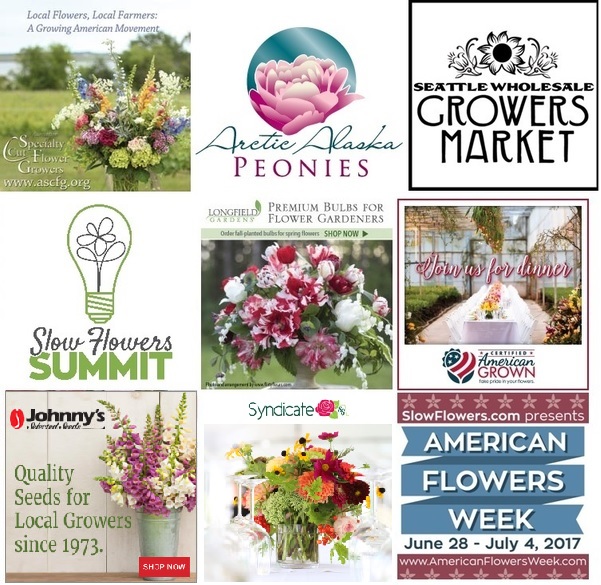 Thank you to family of sponsors
Thank you to family of sponsors
Certified American Grown Flowers. The Certified American-Grown program and label provide a guarantee for designers and consumers on the source of their flowers. Take pride in your flowers and buy with confidence, ask for Certified American Grown Flowers. To learn more visit americangrownflowers.org.
Arctic Alaska Peonies, a cooperative of 50 family farms in the heart of Alaska providing high quality, American Grown peony flowers during the months of July and August. Visit them today at arcticalaskapeonies.com
Seattle Wholesale Growers Market, a farmer-owned cooperative committed to providing the very best the Pacific Northwest has to offer in cut flowers, foliage and plants. The Growers Market’s mission is to foster a vibrant marketplace that sustains local flower farms and provides top-quality products and service to the local floral industry. Find them at seattlewholesalegrowersmarket.com
Longfield Gardens provides home gardeners with high quality flower bulbs and perennials. Their online store offers plants for every region and every season, from tulips and daffodils to dahlias, caladiums and amaryllis. Visit them at lfgardens.com.
Syndicate Sales, an American manufacturer of vases and accessories for the professional florist. Look for the American Flag Icon to find Syndicate’s USA-made products and join the Syndicate Stars loyalty program at syndicatesales.com.
Johnny’s Selected Seeds, an employee-owned company that provides our industry the best flower, herb and vegetable seeds — supplied to farms large and small and even backyard cutting gardens like mine. Check them out at johnnysseeds.com.
Association of Specialty Cut Flower Growers. Formed in 1988, ASCFG was created to educate, unite, and support commercial cut flower growers. It mission is to help growers produce high-quality floral material, and to foster and promote the local availability of that product. Learn more at ascfg.org.
I’m Debra Prinzing, host and producer of the Slow Flowers Podcast. Next week, you’re invited to join me in putting more American grown flowers on the table, one vase at a time. And If you like what you hear, please consider logging onto Itunes and posting a listener review.
The content and opinions expressed here are either mine alone or those of my guests alone, independent of any podcast sponsor or other person, company or organization.
The Slow Flowers Podcast is engineered and edited by Andrew Brenlan. Learn more about his work at KineticTreeFitness.com.









